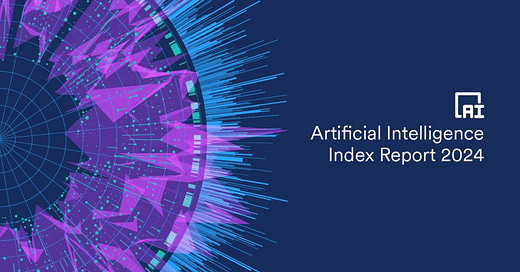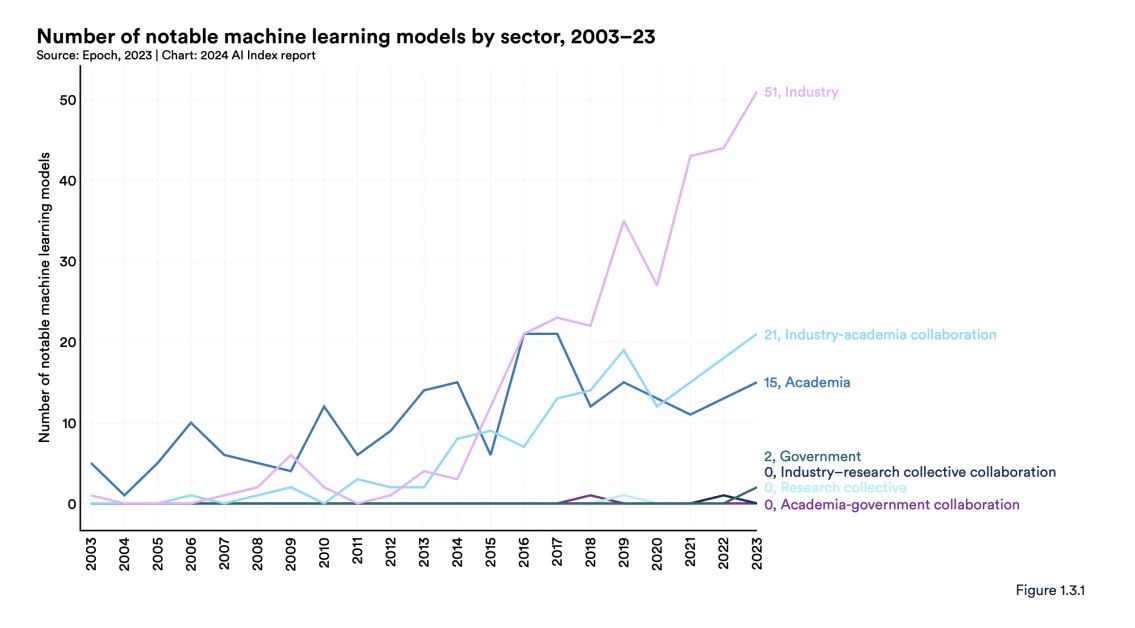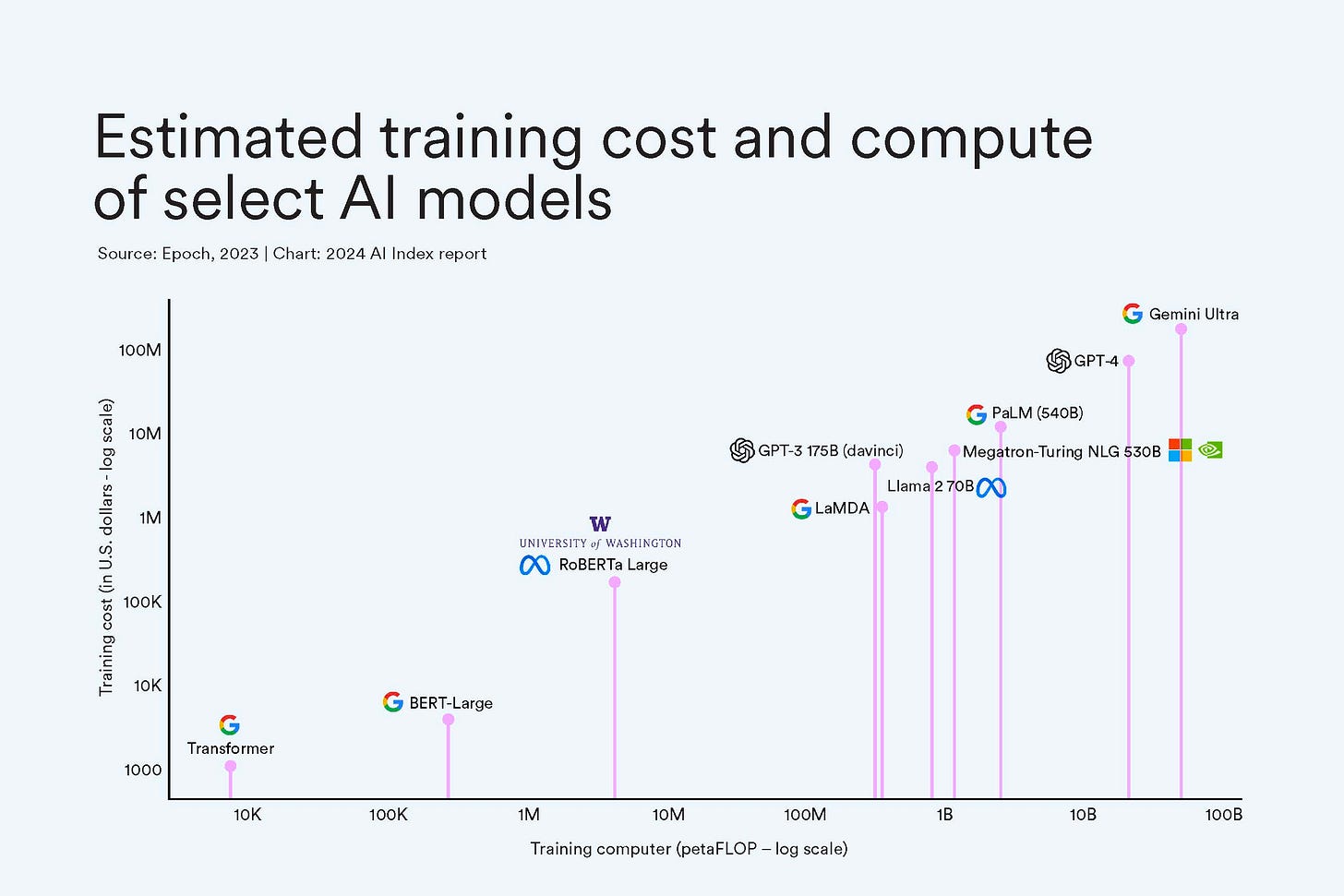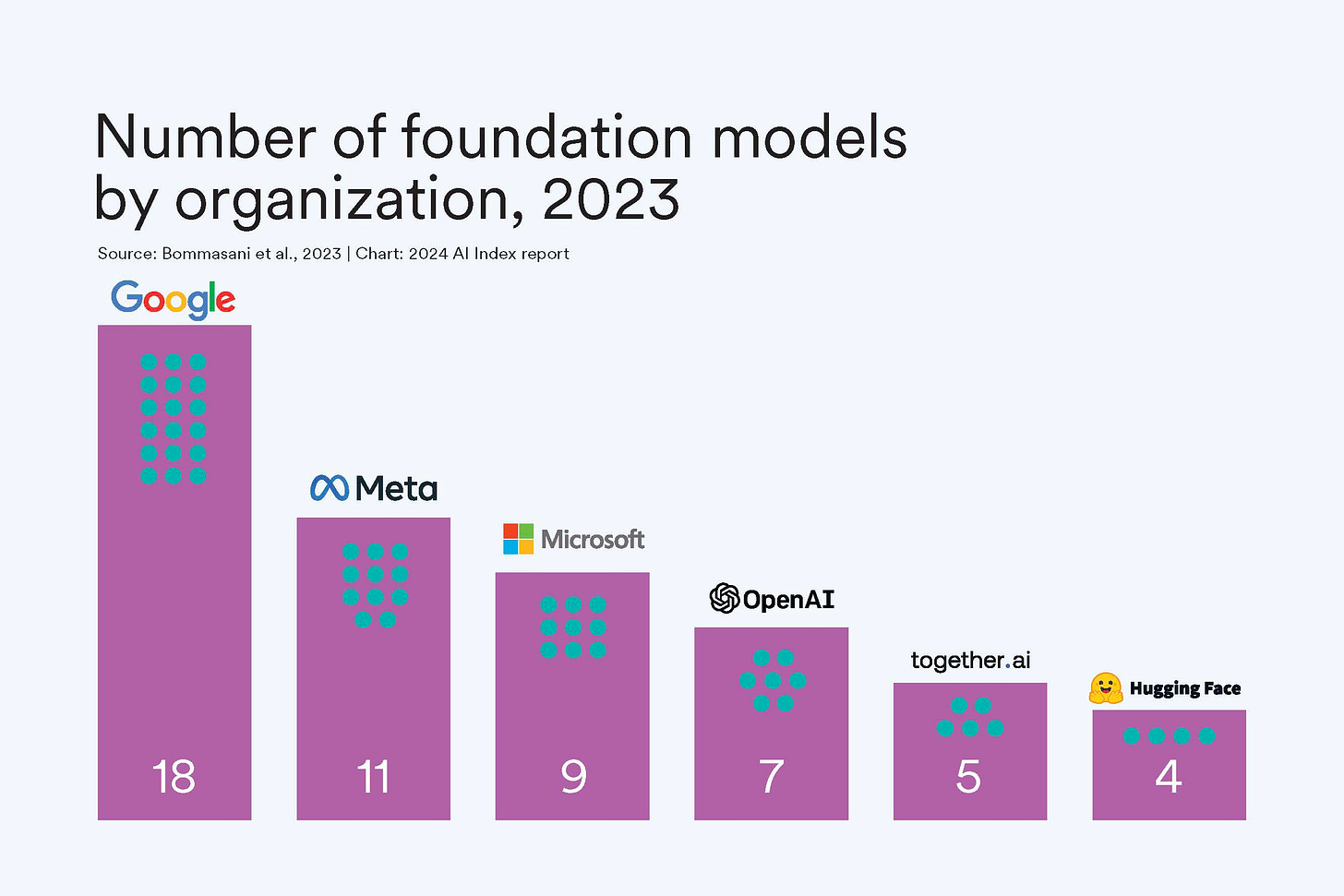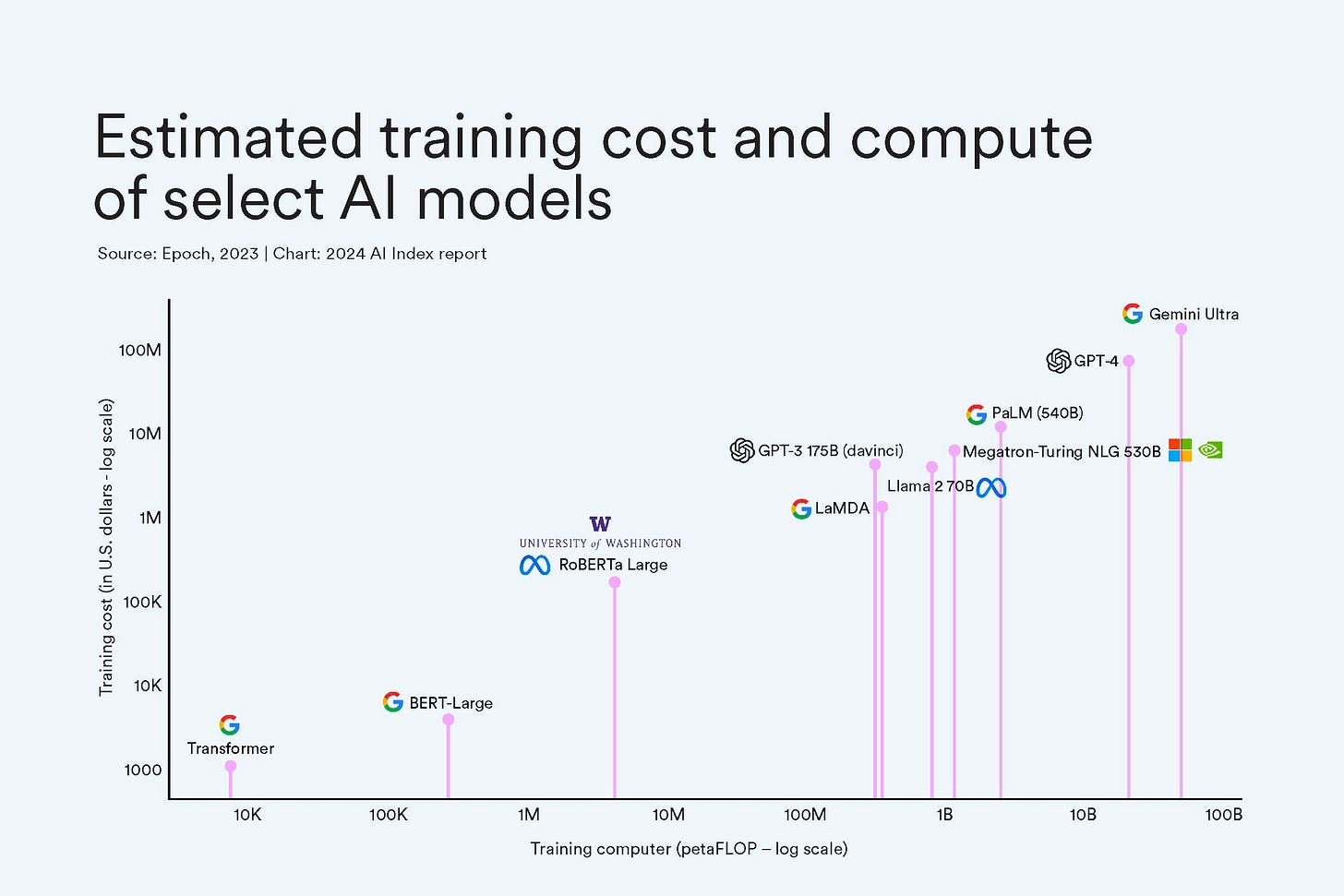Key Takeaways from Stanford’s 2024 AI Index Report
The Stanford Institute for Human-Centered AI (HAI) has released its much-awaited AI Index report for 2024.
As artificial intelligence continues to shape our world at an unprecedented pace, the Stanford Institute for Human-Centered AI (HAI) has released its much-awaited AI Index report for 2024. This comprehensive study delves into the intricate landscape of AI, shedding light on the remarkable progress, emerging challenges, and societal implications of this transformative technology.
The 2024 edition of the AI Index stands out for its expanded scope, offering a wealth of original data and in-depth analysis across crucial topics. From the soaring costs of training advanced AI models to the lack of standardization in responsible AI reporting, the report tackles pressing issues that will define the future of AI development and deployment. Moreover, with a dedicated chapter exploring AI's impact on science and medicine, the 2024 AI Index underscores the technology's potential to drive groundbreaking advancements in these critical fields.
In this blog, we will take a look at the top 10 key takeaways from the report:
1. AI Performance: Surpassing Human Capabilities and Acknowledging Limitations
The 2024 AI Index report offers a balanced assessment of AI's performance compared to human capabilities across a range of benchmarks. The findings showcase AI's remarkable progress in certain tasks, such as image recognition, natural language processing, and strategic decision-making. These advancements highlight the potential of AI to augment human capabilities and drive efficiency across various industries.
However, the report also acknowledges that AI still faces significant challenges in more complex and nuanced tasks that require deeper reasoning, creativity, and adaptability. While AI excels in narrow, well-defined domains, it struggles to match human performance in areas such as abstract problem-solving, emotional intelligence, and ethical judgment.
2. Industry Dominance and Collaboration in AI Research
The report highlights a significant shift in the landscape of AI research, with industry players taking the lead in developing groundbreaking AI models. In 2023, private sector organizations unveiled an impressive array of 51 notable machine learning models, overshadowing academia's contribution of 15 models. This disparity underscores the increasing influence of industry in shaping the trajectory of AI innovation.
Interestingly, the report also reveals a growing trend of cross-sector collaboration, with a record high of 21 models resulting from industry-academia partnerships in 2023. This finding suggests that the future of AI research lies in fostering synergies between the resources and expertise of industry and the rigorous scientific approach of academia. By combining their strengths, these collaborations have the potential to accelerate AI development and address complex challenges that require a multidisciplinary approach.
3. The Escalating Costs of Training Advanced AI Models
One of the most striking revelations from the 2024 AI Index report is the astronomical costs associated with training state-of-the-art AI models. The report estimates that OpenAI's GPT-4 required a staggering $78 million worth of compute resources, while Google's Gemini Ultra model demanded an even more eye-watering $191 million. These figures underscore the immense financial investments required to push the boundaries of AI capabilities.
The soaring costs of training advanced AI models raise important questions about the accessibility and sustainability of cutting-edge AI research. As the financial barriers to entry continue to rise, there is a risk that only a handful of well-resourced organizations will be able to participate in the development of the most sophisticated AI technologies. This concentration of power and resources could have significant implications for the direction and impact of AI research, as well as the distribution of benefits and risks associated with these technologies.
4. The United States' Preeminence in AI Innovation
The 2024 AI Index report confirms the United States' position as the global leader in pioneering AI development. In 2023, U.S.-based institutions were responsible for originating an impressive 61 notable AI models, far surpassing the contributions of other regions such as the European Union (21 models) and China (15 models). This disparity highlights the U.S.'s continued ability to attract top talent, secure substantial investments, and foster a vibrant ecosystem for AI innovation.
Several factors contribute to the United States' ongoing leadership in AI research and development. The presence of world-renowned academic institutions, a thriving startup scene, and the concentration of major technology companies have created a fertile ground for AI talent to flourish. Additionally, the U.S. government's investments in AI research and development, coupled with a supportive policy environment, have played a crucial role in maintaining the country's competitive edge.
A "foundation model" refers to a type of model that is trained on a broad range of data from diverse sources to develop a general understanding of language. These models are "foundation" in the sense that they serve as a base upon which specialized functionalities can be built through further training or fine-tuning on specific tasks or datasets.
5. The Urgent Need for Standardization in Responsible AI Reporting
As AI models become increasingly powerful and pervasive, the 2024 AI Index report exposes a critical issue: the lack of standardization in how leading developers report on their models' risks and limitations. The report reveals that companies such as OpenAI, Google, and Anthropic primarily test their models against different responsible AI benchmarks, making it challenging to systematically compare and assess the potential hazards associated with these technologies.
This fragmented approach to responsible AI reporting hinders the ability of stakeholders, including policymakers, researchers, and the public, to make informed decisions about the development and deployment of AI systems. Without a common framework for evaluating the risks and limitations of AI models, it becomes difficult to establish trust, ensure accountability, and develop effective governance mechanisms.
There is an urgent need for industry-wide standards and collaboration to address this critical challenge. By working together to establish a unified set of metrics and reporting practices, AI developers can promote transparency, build public confidence, and facilitate the responsible advancement of AI technologies. This collaborative effort will require the active participation of industry leaders, academic researchers, policymakers, and other key stakeholders to ensure that the standards developed are comprehensive, rigorous, and aligned with societal values.
6. The Surge in Generative AI Investment
The 2024 AI Index report also reveals a remarkable surge in investment in the generative AI sector, defying the overall decline in AI private investment. In 2023, funding for generative AI technologies nearly octupled compared to the previous year, reaching an astonishing $25.2 billion. This influx of capital reflects the growing excitement and recognition of the immense potential of generative AI across various industries and applications.
Major players in the generative AI space, such as OpenAI, Anthropic, Hugging Face, and Inflection, reported substantial fundraising rounds, indicating the increasing confidence of investors in the transformative power of these technologies. The surge in investment is expected to fuel further innovation, competition, and the development of more sophisticated and diverse generative AI models.
7. AI's Positive Impact on Worker Productivity and Quality
The report delves into the growing body of research examining the impact of AI on the workforce, revealing promising findings that suggest AI technologies can enhance worker productivity and output quality. Several studies conducted in 2023 indicate that AI-powered tools and systems are enabling workers to complete tasks more efficiently and to a higher standard, across various industries and job roles.
These findings underscore the potential of AI to augment human capabilities and bridge skill gaps, empowering workers to focus on higher-value tasks that require creativity, critical thinking, and emotional intelligence. By automating repetitive and time-consuming tasks, AI can free up workers' time and cognitive resources, allowing them to engage in more meaningful and fulfilling work.
However, the report also cautions that the successful integration of AI in the workplace requires careful planning, training, and oversight. The study highlights that utilizing AI without proper guidance and human supervision can lead to diminished performance and unintended consequences. This emphasizes the importance of developing effective human-AI collaboration strategies, investing in worker training and upskilling programs, and establishing clear governance frameworks to ensure that AI is deployed in a way that benefits both workers and organizations.
8. AI Fueling a New Era of Scientific Discovery
The new report underscores the transformative impact of AI on the scientific landscape, highlighting a remarkable surge in the application of AI techniques to tackle complex research challenges. The year 2023 witnessed the emergence of groundbreaking AI tools that are reshaping the way scientists approach problems across various disciplines, from computer science and mathematics to chemistry and materials science.
The report showcases several notable examples of AI's contributions to scientific progress. For instance, AlphaDev, an innovative AI system, has demonstrated its ability to optimize algorithmic sorting efficiency, pushing the boundaries of computational performance. Meanwhile, GNoME, a powerful AI-driven tool, is revolutionizing the field of materials discovery by streamlining the process of identifying and developing novel materials with desired properties.
9. The Surge of AI Regulations in the U.S.
As AI technologies become increasingly ubiquitous and influential, governments worldwide are grappling with the complex challenge of regulating their development and deployment. The 2024 AI Index report reveals a significant uptick in AI-related regulations introduced in the United States over the past year, signaling a growing recognition among policymakers of the need to establish robust guidelines and oversight mechanisms for AI technologies.
In 2023, the U.S. witnessed the introduction of an unprecedented 25 AI-related regulations, marking a dramatic increase from the solitary regulation introduced in 2016. This surge in regulatory activity reflects the accelerating pace of AI advancements and the pressing need to address the societal implications of these technologies. The report highlights that the total number of AI regulations in the U.S. surged by an impressive 56.3% between 2022 and 2023, underscoring the intensifying focus on AI governance.
10. Shifting Perceptions and Public Sentiment of AI
The report’s findings reveal a growing awareness among the general public of the transformative potential of AI, accompanied by heightened concerns about its implications for individuals and communities.
According to a comprehensive global survey conducted by Ipsos, there has been a notable shift in public sentiment regarding AI's impact on daily life. The study reveals that the proportion of individuals who anticipate AI to have a profound effect on their lives within the next three to five years has climbed from 60% to a striking 66% over the past year. Moreover, the survey highlights that over half of the respondents express apprehension towards AI-powered products and services, marking a significant increase from the previous year.
In the United States, Pew Research Center paints a similar picture, indicating that a majority of Americans now harbor more concerns than excitement about AI's influence. The report underscores that this sentiment has grown from 38% in 2022 to a notable 52% in 2024.
These findings underscore the urgent need for open, transparent, and inclusive dialogue surrounding the development and deployment of AI technologies. As public awareness and apprehension about AI continue to mount, it is imperative for policymakers, researchers, industry leaders, and the general public to engage in informed discussions about the potential benefits and risks of AI.
Assessing the State of AI in 2024
The 2024 Stanford AI Index report offers a comprehensive and nuanced assessment of the state of artificial intelligence, shedding light on the rapid advancements, multifaceted challenges, and profound societal implications of this transformative technology. From the astronomical costs associated with training cutting-edge AI models to the glaring lack of standardization in responsible AI reporting, the report underscores the pressing need for collaborative efforts, innovative solutions, and responsible development practices to ensure that AI's potential is harnessed for the benefit of humanity as a whole.
As public awareness and apprehension surrounding AI continue to grow, it is imperative that policymakers, researchers, industry leaders, and the general public engage in inclusive and well-informed discussions to shape the trajectory of this powerful technology. The valuable insights provided by the AI Index report serve as a guiding light in navigating the intricate landscape of AI, empowering us to chart a course toward a more equitable, sustainable, and advantageous AI-driven future.
Keep a lookout for the next editions of AI Uncovered.
Follow on Twitter, LinkedIn, and Instagram for more AI-related content!

